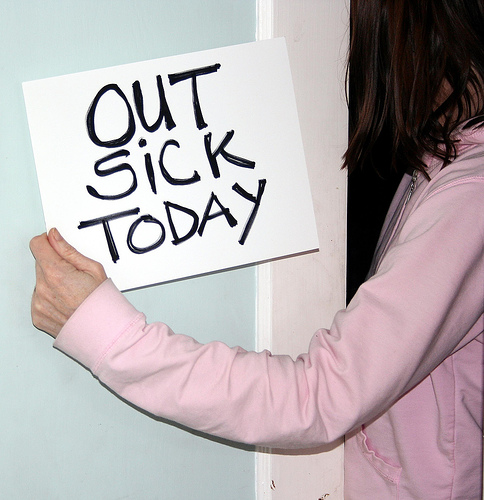Inside Sales Reps: Are You Sick? Stay Home!
 It’s the middle of the shortest month of the year, and between calls I hear the familiar orchestra of different off-putting sounds from other cubes: wheezing, coughing, sniffling, sneezing, and zombie-like groans of inside sales reps plagued with cold and flu symptoms.
It’s the middle of the shortest month of the year, and between calls I hear the familiar orchestra of different off-putting sounds from other cubes: wheezing, coughing, sniffling, sneezing, and zombie-like groans of inside sales reps plagued with cold and flu symptoms.
Cold and flu season is in full swing, which can be the worst enemy to an outbound cold call campaign. Your voice is the most important tool in teleprospecting, and if you sound hoarse or feel tired while talking to your prospects, or are too feverish to concentrate on logging your information into your CRM properly, you may be doing more harm than good.
So why is it that so many people in sales still push to come into work while showing symptoms? In smaller companies, it is often common practice to lump vacation days in with sick days. A day off being sick is time taken away from vacation. On top of that, those of us in sales are a driven bunch, and we know that losing a day of dials isn’t going to help us hit our monthly goals.
But research shows that you are more likely to be productive by taking a day off when you first start to exhibit symptoms than if you decide to come in and work the rest of the week sick. You’ll also help your team to be more productive by not passing a cold, the flu, or other contagious viruses to anyone else in the office. A recent study by the University of Pittsburgh of a simulated flu epidemic showed that workers who stayed at home at least one day after showing symptoms reduced the chance of passing the flu to colleagues by 25%. That number jumps to 40% when workers stay home for two days. For most companies, giving a sick employee two paid days of sick time would be less expensive than giving many employees one paid day of sick time as the sickness spreads.
You may be thinking: “What if I stay in my cube like a hermit? I won’t spread it. Problem solved.” Wrong. You’ll still be touching the same door knobs everyone else uses, making trips to the shared bathroom and water cooler, eating lunch in the company cafeteria, or attending meetings in conference rooms with your colleagues. Another study from the University of Arizona observed 80 employees, some of whom were given a mock virus that mimicked the flu, common cold and stomach bug at the beginning of the work day. Four hours later, more than 50% of the surfaces and employees were infected with at least one kind of virus.
Fortunately, if you’re still concerned about losing a day, you can still be productive at home if you’re healthy enough. If you have important set calls with prospects, you might want to consider sending them an email requesting that they reschedule for a later date so that you can give them your undivided attention. Your prospects will understand, and they will be happier that you’re following up. If you have prospects you have been trying to reach for awhile, or are in your interested pipeline, send them an email asking if they have availability for a specific time and date later on in the week when you’re feeling better. Or take some time to do accounts research from your home computer and find new contacts to add into your CRM for later on in the week or any other administrative tasks you may have been putting off.
Overall, these two studies prove the benefits of staying at home when experiencing cold and flu symptoms. So inside sales reps, when you’re sick in sales, don’t spread your germs around the office!